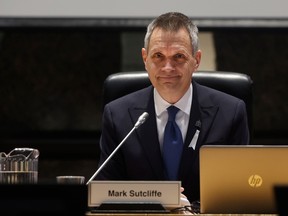Rural and suburban councillors carried the day Wednesday with a 17-8 vote to endorse the directive for city departments and arm’s-length organizations.

Article content
It was a familiar argument with a familiar result.
Just as they did last year, a bloc of councillors from Ottawa’s urban wards railed against Mayor Mark Sutcliffe’s direction to limit the city’s property tax increase at 2.9 per cent — at least for non-transit expenses
And, just as happened last year, rural and suburban councillors carried the day with a 17-8 vote at Wednesday’s city council meeting.
Advertisement 2
Story continues below
Article content
Sutcliffe announced the 2.9 per cent target in a briefing for reporters last week and the target was adopted on Monday by the city’s finance and corporate services committee. It directs city departments and arm’s-length organizations such as the police services board, library board and Ottawa Public Health to deliver budgets with increases of no more than 2.9 per cent.
The exception is OC Transpo, which is grappling with a $25-million operating deficit this year and a jaw-dropping $120-million long-term structural deficit.
Several councillors argued Wednesday that the 2.9 per cent target, which would be below the rate of inflation in recent years, was unrealistic and would degrade the city’s core services. Somerset Ward Coun. Ariel Troster said a decade of Ottawa’s stingy tax increases, 12 per cent below the increases in Toronto, had cost the city $1.5 billion.
“I absolutely agree with the mayor that we’re being shortchanged by other levels of government, but also we really haven’t done our part,” said Troster, who added her residents complained of overflowing trash bins, potholes and crumbling sidewalks.
Article content
Advertisement 3
Story continues below
Article content
“I’m really concerned that these services are being chronically underfunded,” she said.
“At the end of the day, a few extra dollars per month — the equivalent of paying for a coffee and a sandwich on a property tax bill — is a lot lower than what residents would have to pay if they have to go to private operators for recreational services or if they have to Uber or buy a car or take an e-scooter instead of taking the bus,” she said.
“Those of us who’ve been around this table a long time know how creaky things are feeling,” Kitchissippi Coun. Jeff Leiper said.
Problems big (the response to the opioid crisis) and small (inadequate street cleaning) are all being affected by the miserly budgets, Leiper said.
“We feel the strain. Staff are being pushed to the limits, and I’m not certain that a 2.9-per-cent increase is going to help us to address those. The city become less manageable every day that we refuse to contemplate the tax increases that we need in order to provide services.”
College Ward Coun. Laine Johnson said the 2.9 per cent target was “a promise to fail our residents further.”
Advertisement 4
Story continues below
Article content
“We are falling behind,” she said.
The 2.9 per cent target is just that: a target. The final tax increase won’t be decided until the budget process is complete in December.
Voting for the the mayor’s budget direction were councillors Cathy Curry, Steve Desroches, Tim Tierney, David Brown, Wilson Lo, Clarke Kelly, Catherine Kitts, George Darouze, Matt Luloff, Glen Gower, Alan Hubley, David Hill, Laura Dudas — all from wards outside the Greenbelt — and councillors Riley Brockington, Marty Carr, Stéphanie Plante and Sutcliffe, all from wards inside the Greenbelt.
Opposed were councillors Laine Johnson, Jeff Leiper, Rawlson King, Sean Devine, Theresa Kavanagh, Shawn Menard, Ariel Troster and Jessica Bradley, all representing wards inside the Greenbelt.
The same rural-urban split has bedevilled previous Ottawa councils and Sutcliffe was asked after the meeting if he was concerned about the divide.
“I thought today was a great example of democracy,” he answered.
“Everybody got a chance to speak, everybody got a chance to ask their questions and everybody had a chance to vote and we had an outcome. It was respectful, it was professional, it was polite,” he said.
Advertisement 5
Story continues below
Article content
“I don’t think it’s a bad thing that we’re having long conversations and debates about how the City of Ottawa should spend taxpayers’ money. Budgets are tough. We need to be ready to have those kinds of tough conversations. We’re not going to get through this budget process without people feeling some pain and anxiety.”
Departments and boards will have their individual budget discussions in November and December, with city council expected to debate and adopt the final budget on Dec. 11.
Article content
Comments